Managing offline customization of the SMS authentication message
Offline customization provides a central place to manage all of your PingID localizations and allows for the inclusion and exclusion of languages.
About this task
To edit language messages outside of your selected language, download the message .zip file, extract the message files, edit them, rebuild the .zip file, and upload it to the PingID admin portal.
Steps
-
Follow steps 1-5 of Enabling language localization for SMS authentication.
Result:
The Local Language For SMS section expands.
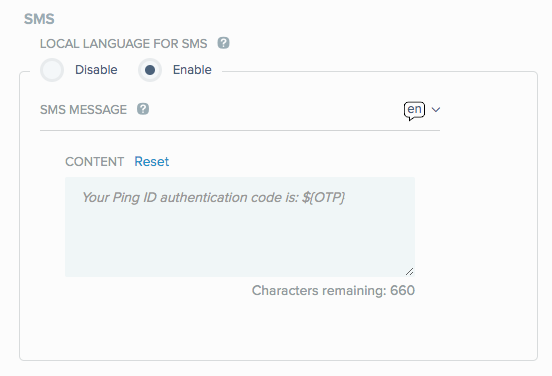
-
Click the Language icon, and then select a language from the list.
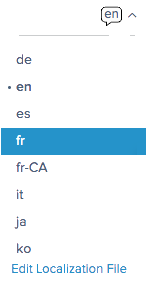
-
To start the offline customization procedure, click Edit Localization File.
Result:
The Localization window opens.
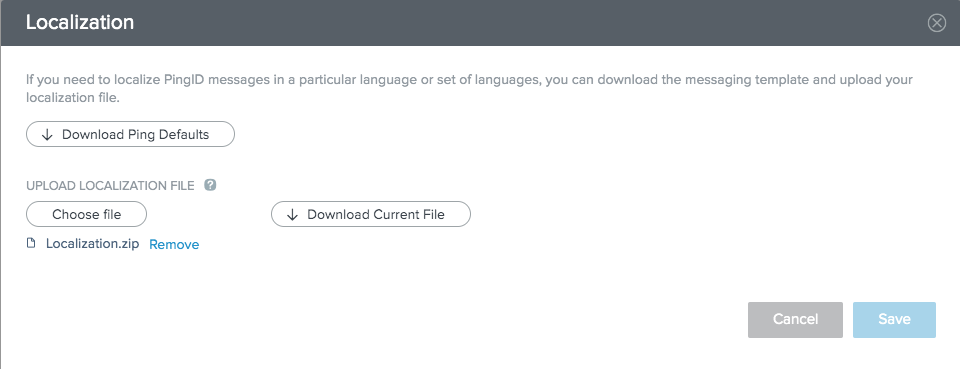
-
For first-time customization, click Download Ping Defaults. If you are continuing from an earlier customization, click Download Current File.
Choose from:
-
Download Ping Defaults: You receive a file called
LocalizationsTemplate.zip. -
Download Current File: You receive a file called
Localizations.zip.The
LocalizationsTemplate.zipfile contain a properties text file for each supported language.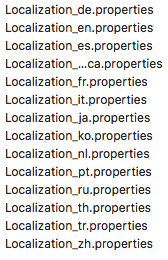
Each of the properties files is a text file with the same layout.
pingid.sms.msg.authentication=Your Ping ID authentication code is: ${OTP} pingid.enrollment.content.description=Great news! Your company is giving you the simplicity of PingID, so you can sign on to all your applications with the added security of a swipe on your mobile device. Enter your email address, and we'll send you a link to download PingID. pingid.non.app.enrollment.text=I want to use a different authentication method. -
-
Extract the
.zipfile.As a concrete example, we will edit the English file and remove several languages.
-
Open
Localization_en.propertiesin a text editor. -
Locate the line commencing with
pingid.sms.msg.authentication=. -
Change the line to your desired message, such as
pingid.sms.msg.authentication=Here is your Ping ID authentication code: ${OTP}.There are several rules for editing language properties files and creation of the
.zipfile:-
The OTP variable is in curly braces \{..}
-
Do not edit the other lines because they are used in other parts of the system.
-
You can revert the SMS authentication message to the default for the language by setting
pingid.sms.msg.authentication=(without a value) or simply deleting the line. -
The
.zipfile must be a flat structure containing only the desired language files, without any folder structures. Attempts to upload invalid.zipstructures returns the error message:File doesn’t contain any valid localizations. -
Only files with filenames complying with the
Localization_<locale>.propertiesnaming convention are uploaded. -
Files whose filenames do not comply with the
Localization_<locale>.propertiesnaming convention are ignored. This permits inclusion of instruction and maintenance files in the.zip, for examplereadme.txt. -
Localization files for unsupported locales are ignored.
The localization properties files are shared across several customizations, currently SMS and Enrollment co-branding. For more information, see Customizing the PingID enrollment page (legacy).
-
-
Save the file.
-
To remove several languages, in the directory of properties files, delete all of the files except the following:
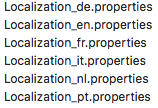
-
Pack the remaining properties into a new
.zipfile, and give it a new name, such asLocalizations_<ABC>.zipThe name is unimportant because it is not preserved in the system.
The
.zipfile must be a flat structure containing only localization properties files and without any folder structures.-
Attempts to upload invalid zip structures returns the error message:
File doesn’t contain any valid localizations. -
Only files with filenames complying with the
Localization_<locale>.propertiesnaming convention are uploaded. -
Files whose filenames do not comply with the
Localization_<locale>.propertiesnaming convention are ignored. This permits inclusion of instruction and maintenance files in the.zip, for examplereadme.txt. -
Localization files for unsupported locales are ignored.
-
-
Upload your new
Localizations_<ABC>.zipfile. -
In the PingID admin portal, go to the Localization window, and then click Choose File.
-
Select
Localizations_<ABC>.zip.Result:
You are shown confirmation.
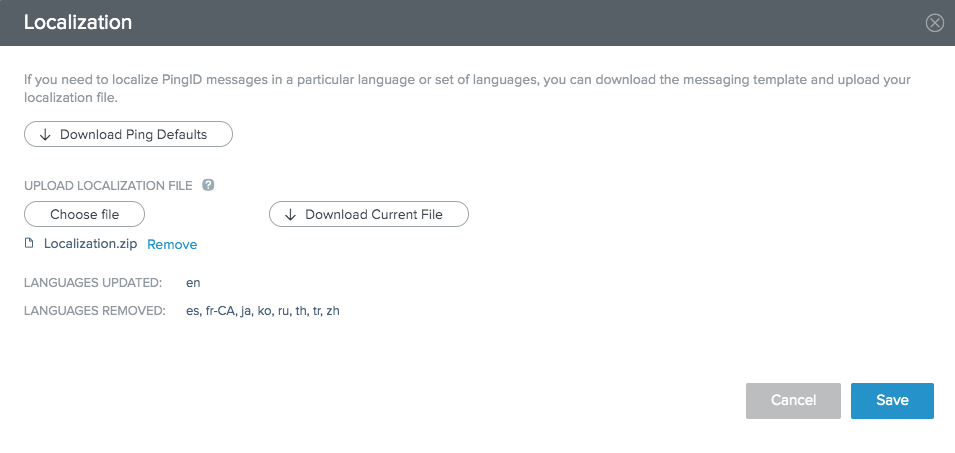
-
Click Save.
Result:
You are asked for final confirmation.
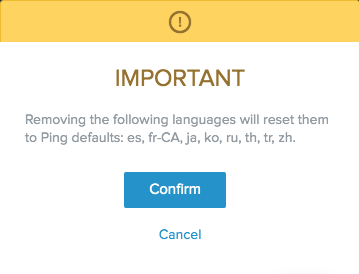
-
To complete the procedure, click Confirm.
-
If there are no language removals, you must click Save to complete the upload.
-
You can return to edit your localizations. In step 2, click Download Current File. The downloaded file is always called
Localizations.zip. Then proceed from step 3.
-
-
Go to Setup → PingID → Configuration and confirm your edit by checking your SMS message settings.